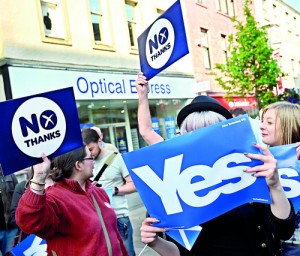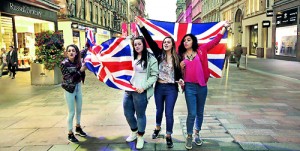Sunday Times 2
Britain’s split on a cliff
GLASGOW, Sept 13, 2014 (AFP) – Five days ahead of Scotland’s independence referendum the race remained too close to call today, with the misgivings of business leaders over the prospect of quitting the United Kingdom becoming louder.
Opinion polls on Friday gave campaigners for Scotland to stay in Britain a slight lead as the leaders of both camps trade increasingly bitter rhetoric.
Scotland’s First Minister Alex Salmond, leader of the pro-independence movement, was on a whistle stop tour of four cities as he battles to win enough support to end the union between Scotland and England, which dates back to 1707.
“Scotland stands on the cusp of history,” he wrote in an article for the Daily Record newspaper. “I am more confident than ever that the people of Scotland are going to say ‘Yes,’” at Thursday’s historic referendum.
A Guardian/ICM poll out Friday put the “Yes” campaign on 49 per cent compared to 51 per cent for the “No” camp when undecided voters were excluded.
The campaign to retain the union was forced to reboot this week after a (London) Sunday Times/YouGov poll out on Sunday put the “Yes” camp narrowly ahead for the first time.

Young women are seen holding Union flags in Glasgow, Scotland. Reuters
This prompted Britain’s main party leaders including Prime Minister David Cameron to rush to Scotland to campaign and promise new devolved powers if Scots vote to stay in Britain.
But a YouGov poll published Friday in The Times put the “No” camp four points ahead on 52 per cent once undecided voters were stripped out.
This was the first time the pollsters have recorded the pro-union side gaining ground since early August.
The new surveys came after a string of big businesses with Scottish interests made statements on their contingency plans in the event of independence.
Banking giant RBS was among those to say they could re-register their headquarters in England following an independence vote but insisted this would not cause major job losses.
Department store John Lewis and supermarket ASDA also warned Scottish shoppers that they could face higher prices post-independence.
But the “Yes” camp has reacted bullishly, insisting that warnings over the potential economic consequences of independence were “entirely speculative”.
Salmond also claims that Cameron has prompted some industry leaders to weigh into the debate.
 “The Prime Minister’s fingerprints are all over the claims from one or two supermarket bosses,” he told an event in Aberdeen.
“The Prime Minister’s fingerprints are all over the claims from one or two supermarket bosses,” he told an event in Aberdeen.
But global investment giant Deutsche Bank on Friday weighed in on the side of “No”, saying that independence “would go down in history as a political and economic mistake” as large as those that caused the Great Depression.
Independence fears increasing
A vote for independence could have a major impact on Britain’s position in international bodies such as the United Nations and European Union.
An independent Scotland would create Europe’s newest state since the disintegration of Yugoslavia in the 1990s.
Acknowledging the gravity of the situation, Finance Minister George Osborne and Bank of England chief Mark Carney on Friday said they had cancelled plans to attend a G20 meeting in Australia because of the referendum.
YouGov’s president Peter Kellner said people’s fears over what independence might do to their bank accounts was increasing, particularly among women.
He added that the intervention this week of Labour’s former British prime minister Gordon Brown, a Scot, had seemingly stemmed the flow of Labour voters to the independence cause.
Meanwhile, UK Independence Party leader Nigel Farage urged a “No” vote during a speech in Glasgow on Friday.
The anti-EU politician, whose party has minimal support in Scotland, said the referendum was not actually about independence, but was instead for “signing up to become a province of the European Union”, arguing that Scotland would have to join the Euro as the UK would not let it share the pound.
“You can’t be an independent country if you are a member of the EU,” he said. “It’s not only a non-starter but also a total illusion.” Farage had been urged to stay away by fellow “No” campaigners amid fears he could harm their case.

